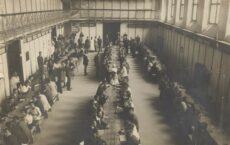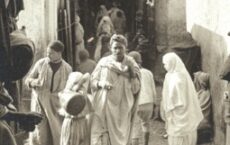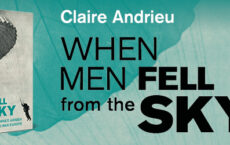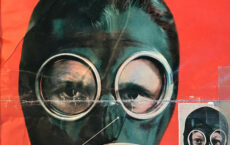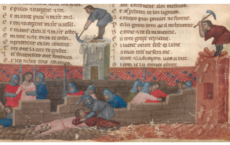
In February 1931, two years before he became chancellor, Adolf Hitler checked in to Berlin’s Hotel Kaiserhof and made it his headquarters in the capital. The building soon swarmed with Nazis, who transformed the clientele overnight. Jewish custom evaporated. Business suffered. A year and a half later, with revenues in freefall, the hotel’s parent company […]
Read MoreWhite-bearded and dignified, Leo Baeck disembarked an airplane in New York’s La Guardia airport in January 1948. The seventy-four year-old rabbi came to preach in the United States as part of the American Jewish Cavalcade, a religious revival program of the Reform movement. As the former official leader of German Jewry under Nazism and a […]
Read MoreStudents and professors being fed with Commonwealth Fund donation in Innsbruck, June 1921. Hoover Institution Archives In late 1920 Vienna, an old café basement, recently used as a storeroom for coal, was transformed; long tables, covered in white linen and decorated with flowers, were set up, and 170 people dined there daily. This was the scene […]
Read MoreA generic narrative of decolonization has informed how we think about the history of empire. According to this narrative, a colonized people gradually becomes conscious of its predicament. Through this consciousness, it empowers itself eventually to throw off the colonizer. The imperial domain thus “decolonizes.” The central argument of French Colonialism from the Ancien Régime […]
Read MoreWW2 Comparative History from BelowWritten by Claire Andrieu Unlike the objects of its title, the subject of this book did not fall from the sky. I did not set out to write a comparative history of the reception of downed airmen in Britain, France and Germany during World War II. The story of When Men […]
Read MoreImage Description: The front page of a 1937 edition of Die Sirene, the monthly magazine for the Nazi Reichsluftschutzbund (or Reich Air Protection League). The man on the front sports the Volksgasmaske, or “People’s Gas Mask.” While most technical experts knew that the mass-produced mask offered little protection against chemical weapons, the captions boast of its technical specifications and claim that: “Every German can feel safe under the gas mask!”
Read MoreThe HBO series Game of Thrones is perhaps the most recent expression of the general view that the Middle Ages were rape-prone. Humiliation and exploitation of female (and male) characters repeatedly come together with direct sexual violence, which is only partially reframed through a series of revenge-sequences in the last season. The cinematic quality of […]
Read MoreFor thousands of years, wars have generally ended in the same way: a military invasion is followed by a decisive victory or negotiated ceasefire. Treaties are signed, territories seized, and reparations procured — the invading army leaves. To avoid the same failures of the Treaty of Versailles (1919), the victorious Allied armies took additional measures […]
Read MoreIn February 1931, two years before he became chancellor, Adolf Hitler checked in to Berlin’s Hotel Kaiserhof and made it his headquarters in the capital. The building soon swarmed with Nazis, who transformed the clientele overnight. Jewish custom evaporated. Business suffered. A year and a half later, with revenues in freefall, the hotel’s parent company […]
Read MoreWhite-bearded and dignified, Leo Baeck disembarked an airplane in New York’s La Guardia airport in January 1948. The seventy-four year-old rabbi came to preach in the United States as part of the American Jewish Cavalcade, a religious revival program of the Reform movement. As the former official leader of German Jewry under Nazism and a […]
Read MoreStudents and professors being fed with Commonwealth Fund donation in Innsbruck, June 1921. Hoover Institution Archives In late 1920 Vienna, an old café basement, recently used as a storeroom for coal, was transformed; long tables, covered in white linen and decorated with flowers, were set up, and 170 people dined there daily. This was the scene […]
Read MoreA generic narrative of decolonization has informed how we think about the history of empire. According to this narrative, a colonized people gradually becomes conscious of its predicament. Through this consciousness, it empowers itself eventually to throw off the colonizer. The imperial domain thus “decolonizes.” The central argument of French Colonialism from the Ancien Régime […]
Read MoreWW2 Comparative History from BelowWritten by Claire Andrieu Unlike the objects of its title, the subject of this book did not fall from the sky. I did not set out to write a comparative history of the reception of downed airmen in Britain, France and Germany during World War II. The story of When Men […]
Read MoreImage Description: The front page of a 1937 edition of Die Sirene, the monthly magazine for the Nazi...
Read MoreThe HBO series Game of Thrones is perhaps the most recent expression of the general view that the Middle Ages were rape-prone. Humiliation and exploitation of female (and male) characters repeatedly come together with direct sexual violence, which is only partially reframed through a series of revenge-sequences in the last season. The cinematic quality of […]
Read MoreFor thousands of years, wars have generally ended in the same way: a military invasion is followed by a decisive victory or negotiated ceasefire. Treaties are signed, territories seized, and reparations procured — the invading army leaves. To avoid the same failures of the Treaty of Versailles (1919), the victorious Allied armies took additional measures […]
Read MoreKeep up with the latest from Cambridge University Press on our social media accounts.
Tomás Irish is Associate Professor of Modern History at Swansea University. A specialist in the cultural history of the First World War and interwar Europe, his books include the prizewinning The University at War 1914-25: Britain, France and the United States (2015), and Trinity in War and Revolution, 1912-23 (2015).
Merry E. Wiesner-Hanks is Distinguished Professor of History Emerita at the University of Wisconsin-Milwaukee and an experienced textbook author.
University of Oxford
University of Sheffield
Dreams and Visions in the Early Middle Ages
French Colonial Soldiers in German Captivity during World War II
American Grand Strategy in the Mediterranean during World War II
Combat and Genocide on the Eastern Front
She-Wolf: The Story of a Roman Icon
Srebrenica in the Aftermath of Genocide
A Concise History of Sweden
A Revolution in Taste
The Horse in Human History
Srebrenica in the Aftermath of Genocide
Venice: History of the Floating City
Nazi Empire
London: A Social and Cultural History, 1550–1750
The Spanish Civil War
Operation Typhoon
Seduced by Secrets
A Short History of Ireland
The American Mission and the \\\\\\\'Evil Empire\\\\\\\'
Creating the Nazi Marketplace
London: A Social and Cultural History, 1550-1750
The Social Life of Hagiography in the Merovingian Kingdom
The First French Reformation
Behind the Front
The Fascists and the Jews of Italy
Twentieth-Century Spain
Cambridge University Press Archivist
The People\'s Game
The Short Story and the First World War
The American Army and the First World War
A Divided Republic
Wine, Sugar, and the Making of Modern France
Ferdinand II, Counter-Reformation Emperor, 1578–1637
Publisher
German Immigrants, Race, and Citizenship in the Civil War Era
Wilhelm II
The Struggle for the Eurasian Borderlands
Fixed Ideas of Money
The Hammer of Witches
Eating and Ethics in Shakespeare\\\\\\\'s England
To receive updates on European History news from Cambridge University Press and Fifteen Eighty Four, please join our email list below. We will not disclose your email address to any third party



